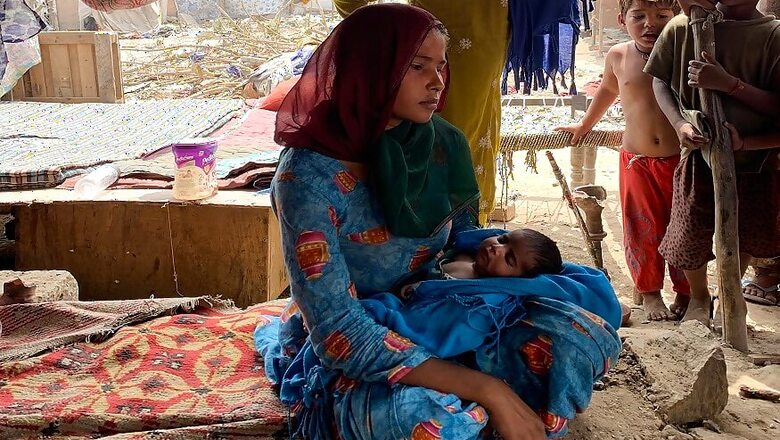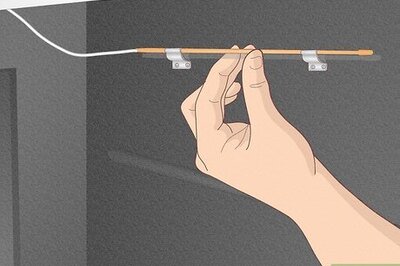
views
Since April 7, when she gave birth to her fourth child, Neetu has not had a full meal. The 32-year-old is so weak that she can barely stand on her feet. Not only is she always hungry because her husband, who earned enough for his family as a cobbler, has been out of business for the past three weeks and can't afford to buy food now, she also hasn't had her post-operative medication.
"We don't have milk. Sometimes we get food, sometimes we don't. Some medicines had also been prescribed, but I don't think I've had any. I feel dizzy mostly and weak always. My child is also weak," she says before closing her eyes and lying on her bed.
Prem Nagar basti, an urban slum in Old Gurugram, where Neetu lives, has been raising money to take care of her. By turns her neighbours have been feeding her newborn.
"They did not have money even to have a cup of tea. They have nothing. Ten days back after she was brought from ICU someone donated to them 10 kilos of wheat. They don't even have money to have it grounded into flour. I have been feeding the child. She has no milk in her," Kallo Devi her neighbour says.
She says that Neetu's husband, who is handicapped, could have begged around for food, desperate as he is, except his wheelchair was stolen a few weeks ago.
Barely a kilometre away from where Neetu lives, in another slum, close to Gurugam bus terminal, Aanchal, who delivered her second child nine days ago was also incapacitated due to weakness. But on Thursday she somehow summoned the energy to get up and walk, for the first time since the delivery, half a kilometer to a community langar. So hungry was she.
"Someone came with food the other day. I had some rice. That's all. I have been feeling hungry and dizzy," Aanchal says. Her husband used to earn money playing dhol and doing odd jobs as a labourer. Sitting beside Aanchal is her sister-in-law, 20 year-old Neelam, who delivered 15 days ago. Her husband also worked as a part-time dhol player and a labourer.
Neelam's mother wondered, "Why does the government not think of us? After many days the government set up a langar of puri aaloo here. But tell me, will a 15 days-old child eat puri aaloo? The government asked us to stay put. To not move anywhere. But should we then just sit here and watch our child die of hunger? These girls have barely eaten. So they can't breast-feed their children. His father went out to get milk powder from somewhere. The cops caught hold of him. It was only after he begged for a long time that they let him go."
Of all the classes and cross-sections of the society, it is the new mothers from financially weaker families who have suffered perhaps the most during the current period of lockdown.
Zehra Mehdi, a psychoanalytic psychotherapist, who has been offering pro bono mental health sessions on Skype, over emails and phone, during the current lockdown period, says that financial distress caused due to unemployment in the lockdown period is now attacking the very dignity of such vulnerable women.
"One important question is that of dignity. When a woman says that I'm so weak I'm not in a position to breast-feed my child, it's really taking a toll on her self-pride. But she is left with no other option but to say this to a perfect stranger in the hope that this will somehow help herself and her child survive," Zehra says.
She says she's received a lot of calls from women and men from metropolitan cities and from tier-2 and tier-3 cities as well. "The men generally need help in dealing with their anger. The women sound more depressed, more anxious. Some don't have the little freedoms they enjoyed before the lockdown. Now they're living 24*7 with abusive husbands or abusive mothers-in-law. It's really taking a psychological and physical toll on them."
Zehra added it emerged from the conversations she had with women from tier-2 and tier-3 cities that "women were predominantly occupied with the wellbeing of their children. How will they take care of them? How will they feed themselves and their children? These are very serious questions facing them right now."
Another such woman who suffered a lot of psychological and physical pain was Qamar Jahan. On the night of April 8, her condition deteriorated rapidly. Her husband couldn't find a vehicle in time for her. So the delivery had to be done at home, at great risk to Qamar and her child.
"Now both my child and I are fine but that night my condition deteriorated very quickly. But even now there is not enough to eat. My husband used to work a factory that made envelops. That is shut right now. We have to pay our rent also. We are somehow feeding ourselves and our child these days but it's getting tougher by the day."




















Comments
0 comment